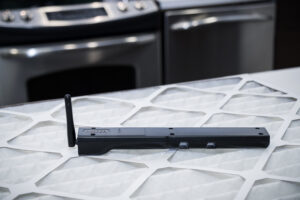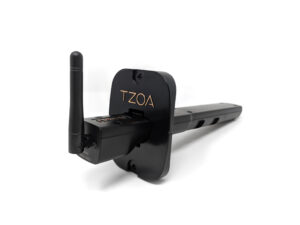
Residential air quality perfected with Canadian ingenuity
EP&T Magazine
Electronics Engineering contract Covid 19 Manufacturing pandemic TZOAVancouver OEM finds success in partnering with local CEM
British Columbia’s high tech sector is fueling a growing industrial base for innovative solutions and opportunities within Canada. Supported by strong and diverse electronics manufacturing, BC is now known for more than its natural resources, but also a vibrant mix of aerospace, shipbuilding, clean-tech and life sciences companies. The lower mainland of Vancouver is attracting and supporting some of the most successful and innovative companies in the world.

Central Air Monitor – for homes with a central forced air system.
Vancouver’s TZOA and Burnaby-based Dorigo Systems are examples of forward thinking companies collaborating together to bring innovative products to market and fueling BC’s growth within the high tech sector. TZOA is redefining how residential indoor air quality is monitored and managed, vastly improving daily life.
Why improve indoor air quality?
“We spend on average 90% of our time indoors in spaces that are heated or cooled for our comfort,” says Kevin Hart, president of TZOA. “These indoor spaces often consume a lot of energy and contain potentially harmful pollution levels that directly impact our health and well-being.”
There are a number of factors that affect indoor air quality from humidity, furniture materials, how homes are cleaned and how they are heated and cooled to name but a few. When these factors combine to create less than optimal air quality, it has a dramatic impact on our bodies, especially our lungs. Indoor pollution contributes to eye, nose and throat irritations as well as increased levels of fatigue. For some, living in damp and moldy homes significantly increases the risk of asthma. Improving indoor air quality is essential so we don’t put our health at risk.
TZOA focuses on controlling indoor air quality throughout the entire home by adding a layer of intelligence to residential HVAC systems. Their solution is Haven, an Internet of Things (IoT) monitoring system that uses machine learning and artificial intelligence to empower residential users with the ability to control their own indoor environment.
Up until now, air quality control was a niche market with two types of solutions: either very expensive or cheap and low quality, according to Hart. Typically, air quality monitors were only used by research labs, manufacturers and research institutions and required investments of up to $100,000. Haven was created as an affordable and technologically advanced solution for improving air quality in our homes.

“Haven allows you to ‘see’ what is in your air,” states Hart. “We give you eyes into what you are breathing indoors in your home and actionable ways to improve it using our patented air monitor.”
The Haven whole home central air monitoring solution was launched in 2018 and is designed to leverage the efficiencies of cloud computing and IoT to properly monitor and control indoor air quality where it needs to be – in the air duct. Haven monitors air pollution levels to understand what activities need to be taken for more ventilation and filtration in our homes.
“Bringing Haven to market required the creation of prototypes to validate design with professional production runs,” states Hart, “and we also needed the ability to ramp up manufacturing of our monitors as our solution was embraced by the market.”
Partnering with the ideal electronics manufacturing services provider was critical to TZOA’s growth. Working locally with an EMS provider in Vancouver’s lower mainland turned out to be the best option for TZOA’s design team, as time between iterations was vastly improved. The team didn’t need to wait weeks to receive prototypes from overseas to see if they “got it right”. Instead, establishing a ‘belly to belly’ relationship with a local EMS provider was preferred. 
“We assessed several EMS companies and narrowed our choice to the one that had the capacity to grow and innovate with us,” says Vlad Lavrovsky, CTO at TZOA, “Dorigo Systems was the best fit for providing us with the strong manufacturing capabilities we were seeking along with a willingness to partner with us to bring Haven to market.”
TZOA partnered with Dorigo right from its start-up phase, as the CEM facilitated onsite tours from potential investors and HVAC suppliers to view how Haven’s central air monitor was being prototyped to the highest standards and capabilities.
“When you are in start-up mode it is difficult for a small company to build pcb assemblies when you are focusing on designing the technology platform,” adds Lavrovsky. “Dorigo’s ability to iterate on the circuit board and dial-in all of the settings upfront gave us a critical advantage.”

The Haven whole home air monitoring system uses a pcb assembly with a unique shape and length, which presented a number of design challenges for TZOA.
“The bow and twist of the pcb impacted yield and strain on solder joints,” states Lavrovsky. “We also had to refactor the design by moving parts inward to reduce strain and displacement.”
The Haven pcb assemblies were inspected using Dorigo’s Koh Young KY8030-3 solder paste inspection system (SPI) and 3D AOI system, providing true automated optical inspection. The system detects all kinds of potential assembly defects using patented shadow-free 3D vision technology.
“When it comes to building high-precision electronics, there is no margin for error, says Paul Vasvary, business development manager, Dorigo. “We continue to adapt our electronics manufacturing processes and technologies to achieve close to zero defects while ensuring a seamless customer experience.”
Dorigo’s automated SMT assembly equipment includes high-speed Panasonic multi-functional pick and place machines that can place chips as small as 01005 and can handle a broad range of components with lead pitch as small as 0.3mm, including micro BGA, BGA, CSP, LGA, FN, QFP and other odd-form packages, such as connectors as large as 150mm in length.
“Dorigo has provided us with flawless execution in manufacturing our boards,” states Lavrovsky.

Kevin Hart, President, TZOA
COVID-19 impacts air quality
The COVID-19 pandemic has accelerated demand for ensuring clean breathing spaces, as Canada’s working population is using their homes in new ways. From being a home office, school, work out space to numerous other activities, most installed residential air control systems aren’t designed to keep up with this sort of use.
“We’re seeing a more intense use of the typical home,” says Hart. “Peace of mind in breathing the cleanest air in your home is now at the forefront for most property owners.
As demand continues to rise, TZOA leans towards Dorigo Systems’ local supply chain and new industry 4.0 manufacturing facility located in Burnaby’s Glenlyon Office Park to ensure strong and stable growth.
“Dorigo’s turnkey capabilities will enable us to scale more gracefully over time,” says Hart, stating he enjoys the added flexibility, and benefits from the company’s purchasing power and the ability to quickly optimize all steps of the process.
Led by its Haven system, TZOA aims to become one of the largest providers of indoor air environment quality systems worldwide.
